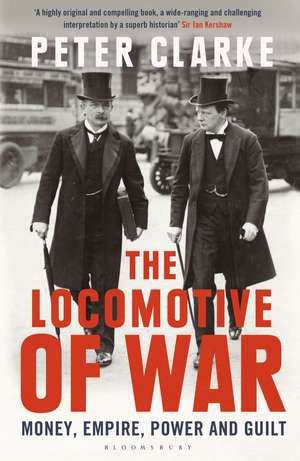The Locomotive of War: Money, Empire, Power and Guilt
Autor Peter Clarkeen Limba Engleză Paperback – 24 ian 2018
Preț: 51.09 lei
Preț vechi: 65.06 lei
-21% Nou
Puncte Express: 77
Preț estimativ în valută:
9.78€ • 10.19$ • 8.09£
9.78€ • 10.19$ • 8.09£
Carte disponibilă
Livrare economică 13-27 martie
Preluare comenzi: 021 569.72.76
Specificații
ISBN-13: 9781408851685
ISBN-10: 1408851687
Pagini: 432
Dimensiuni: 129 x 198 x 38 mm
Greutate: 0.36 kg
Editura: Bloomsbury Publishing
Colecția Bloomsbury Paperbacks
Locul publicării:London, United Kingdom
ISBN-10: 1408851687
Pagini: 432
Dimensiuni: 129 x 198 x 38 mm
Greutate: 0.36 kg
Editura: Bloomsbury Publishing
Colecția Bloomsbury Paperbacks
Locul publicării:London, United Kingdom
Caracteristici
Peter Clarke is one of the foremost historians of twentieth-century Britain. His volume in the Penguin History of Britain is the account of the period
Notă biografică
Peter Clarke was formerly a professor of modern history and Master of Trinity Hall at Cambridge. His many books include Keynes: The Twentieth Century's Most Influential Economist, the acclaimed final volume of the Penguin History of Britain, Hope and Glory, Britain 1900-2000 and Mr Churchill's Profession, a study of Churchill as writer. He is now resident in Cambridge.
Recenzii
A highly original and compelling book, a wide-ranging and challenging interpretation by a superb historian. Clarke brilliantly shows how the moral imperatives of Anglo-American liberalism shaped the impact of total war in the West after 1945. In stark contrast to Trotsky's prediction of world revolution, major social advances under reformed capitalism were the result - that is, until regression began with the new inequalities that set in during the 1970s
Plausible and enormously engaging . An old-fashioned kind of history, brimming with ideas and based on scrupulous research, and it is all the better for it . Clarke is such an acute writer that almost every paragraph has something surprising to say. Perhaps above all, he has an unrivalled ability to leaven serious political analysis with gossipy anecdotal details
The Locomotive of War exposes the lineaments of the liberal morality that twentieth-century Anglo-American decision-makers brought to the making of war. Clarke tracks the evolving relationships among Gladstone's trans-Atlantic descendants - from Keynes, Grey, Lloyd George and Wilson to Churchill and Roosevelt - illuminating the affinities, but also the tensions and divergences among them. Brilliant, forensic and sparkling with arresting vignettes, Clarke's reconstruction of the political economy of liberal warfare reinterprets the twentieth century and asks unsettling questions of the present
It is a tribute to his protean personality, and to Clarke's diligent scholarship and elegant narration, that every aspect of his [Churchill's] life remains eternally fascinating
Fascinating, erudite and witty
Clarke gives us the fullest account yet of Churchill's hair-raising attitude towards money ... A scholarly gem: polished and sparkling and a lasting contribution to our understanding of Churchill
Engrossing . With effortless command of detail and pointed anecdote, Clarke tells the story through the biographies and interactions of leading members of a gilded elite on both sides of the Atlantic
As a skilled biographer Clarke has a keen eye for the telling anecdote and a finely honed gift for the brilliant vignette. All of this stands him in good stead as he traces the fortunes of liberalism in Britain and the United States through the prisms of David Lloyd George and Woodrow Wilson, Franklin Delano Roosevelt and Winston Churchill, and, more specifically, Keynes
Clarke reveals the subtle interplay between personalities and history ... original, intriguing and sometimes disturbing
Plausible and enormously engaging . An old-fashioned kind of history, brimming with ideas and based on scrupulous research, and it is all the better for it . Clarke is such an acute writer that almost every paragraph has something surprising to say. Perhaps above all, he has an unrivalled ability to leaven serious political analysis with gossipy anecdotal details
The Locomotive of War exposes the lineaments of the liberal morality that twentieth-century Anglo-American decision-makers brought to the making of war. Clarke tracks the evolving relationships among Gladstone's trans-Atlantic descendants - from Keynes, Grey, Lloyd George and Wilson to Churchill and Roosevelt - illuminating the affinities, but also the tensions and divergences among them. Brilliant, forensic and sparkling with arresting vignettes, Clarke's reconstruction of the political economy of liberal warfare reinterprets the twentieth century and asks unsettling questions of the present
It is a tribute to his protean personality, and to Clarke's diligent scholarship and elegant narration, that every aspect of his [Churchill's] life remains eternally fascinating
Fascinating, erudite and witty
Clarke gives us the fullest account yet of Churchill's hair-raising attitude towards money ... A scholarly gem: polished and sparkling and a lasting contribution to our understanding of Churchill
Engrossing . With effortless command of detail and pointed anecdote, Clarke tells the story through the biographies and interactions of leading members of a gilded elite on both sides of the Atlantic
As a skilled biographer Clarke has a keen eye for the telling anecdote and a finely honed gift for the brilliant vignette. All of this stands him in good stead as he traces the fortunes of liberalism in Britain and the United States through the prisms of David Lloyd George and Woodrow Wilson, Franklin Delano Roosevelt and Winston Churchill, and, more specifically, Keynes
Clarke reveals the subtle interplay between personalities and history ... original, intriguing and sometimes disturbing
